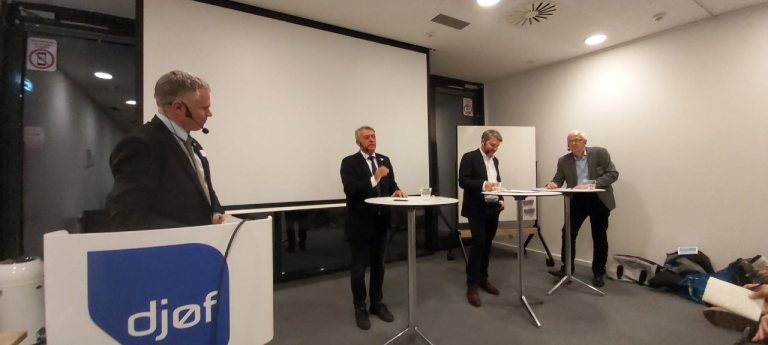
The event held in Copenhagen was organized by the Danish attorney and economist’s union Djøf, one of the leading in the country, with more than 80,000 members, and had a considerable turnout
The Catalan National Assembly took part in a conference on the Catalan independence movement and the violation of human rights commited by the Spain authorities, which was held yesterday evening in Copenhagen, Denmark. The event was attended by the National Secretary and International Affairs Coordinator of the Catalan organization, Jaume Bardolet, the professor of Constitutional Law Jørgen Albæk Jensen, and the Rector of the University of Geneva, and Doctor in Communication Sciences Mathieu Crettenand. Jensen and Crettenand took part as observers at the International Trial Watch mission to observe the trial of Catalan civic and political leaders.
Bardolet kicked off with a short introduction on the current events in Catalonia, applauding the internationalization of the Catalan independence process as reflected in the considerable number of countries that took part in the UN Universal Periodic Review of Spain held last Wednesday. He ended his speech by calling for the support of international actors and the importance of the defence of human rights. “The conflict in Catalonia will not end until the right to self-determination is respected. We need international actors to raise their voices. Political parties, activists, convinced democrats. We don’t ask for your support for our independence, but for the respect of human rights.”
Mathieu Crettenand emphasized the double morality of the Spanish government in recognizing the right of self-determination in other countries but not in Catalonia, stating that “recognizing this right would entail finally overcoming the 78 regime”, which closed the post-Franco period. He also emphasized the absence of violence during the referendum by voters, ending his statement stating, “the referendum showed that the will of a united people cannot be stopped.”
Finally, researcher Jørgen Albæk Jensen introduced Denmark’s legislation on human rights, which “follows the decisions of the European Court of Justice”. When asked about Denmark’s position on a possible referendum, he said, “If the Faroe Islands were to become independent, I’m sure the Danish government would be ready to at least discuss it.”
Danish support for a political dialogue and condemnation of police repression
Denmark has historically been one of the countries which has supported the dialogue between Catalonia and Spain, with some of the political parties, such as the green-red Enhedlisten pushing motions to recognize the Catalan right to decide on its future, voted by the majority of the Danish parliament in 2015.
In September of 2017, some 17 Danish MPs signed a letter addressing the Spanish authorities stating their concern for the situation in Catalonia and encouraging dialogue. Barely two months later, Danish Foreign Minister Anders Samuelsen appeared before the Foreign Affairs Commission of the Danish parliament to discuss the political situation after the Catalan independence referendum and the Police violence and fundamental rights violations that had taken place. In 2018, the same institution invited former Catalan president Carles Puigdemont, who explained the Catalan struggle to the parties of the opposition.
More recently, in December 2019 the Foreign Affairs Committee of the Danish Parliament held a session on Catalonia, in which the Ministry of Foreign Affairs addressed questions posed by MPs from several parties in relation to the sentences against the Catalan civil and political leaders, and the police repression against peaceful pro independence protesters.